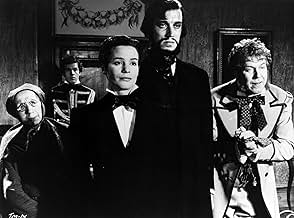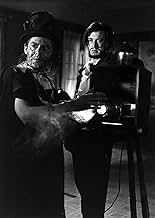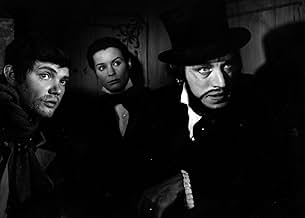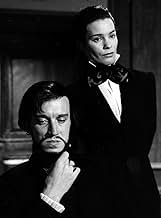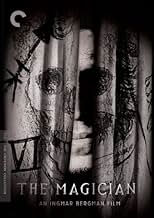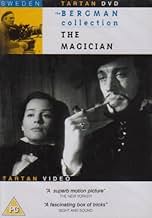En la Suecia del siglo XIX, un mago deambulante y su asistente son perseguidos por las autoridades. Su captura, sin embargo, no trae gloria a aquellos en el poder.En la Suecia del siglo XIX, un mago deambulante y su asistente son perseguidos por las autoridades. Su captura, sin embargo, no trae gloria a aquellos en el poder.En la Suecia del siglo XIX, un mago deambulante y su asistente son perseguidos por las autoridades. Su captura, sin embargo, no trae gloria a aquellos en el poder.
- Nominada a1 premio BAFTA
- 3 premios ganados y 2 nominaciones en total
- Border Officer
- (sin créditos)
- Border Officer
- (sin créditos)
- Dirección
- Guionista
- Todo el elenco y el equipo
- Producción, taquilla y más en IMDbPro
Argumento
¿Sabías que…?
- TriviaThe character of Vogler was based on Bergman himself.
- Errores(at about 13 mins) When Tubal gets on in a carriage, a policeman hangs outside the carriage door but in the very next shot, the policeman is again seen to hang on the same door.
- Citas
Johan Spegel: I didn't really die, yet I've already begun haunting people. Actually, I think I make a better ghost than human being. I'm finally convincing. Something I never was as an actor. A shadow of a shadow. Don't be concerned for my sake, sir. I've already begun to decompose.
- ConexionesFeatured in Premio Donostia a Max Von Sydow (2006)
The Magician is set in the mid 19th century and is Bergman right after the one-two punch of The Seventh Seal and Wild Strawberries continuing his cinematic inquest into truth and enlightenment. The conflict is not exactly plot driven, though there is a solid premise and a good story: a "Magical Health Troupe" (that may not be the exact wording, but 'health' is in there) arrives to do a performance - this includes the Magician Vogler (Max von Sydow) and his assistant "Mr" Vogler (Ingrid Thulin, dressed like a man for a little while) - for a heavily skeptical doctor and his group (other Bergman regulars include Erland Josephsson and Gunnar Bjornstrand, the latter being the doctor). This troupe carries some baggage with them - they've been in prison before, it's spoken of - and it's obvious just by Sydow's face, with a fake beard and dyed hair, that there's something 'funny' going on.
Rationality and irrationality, that's what's at play here, and also the whole idea of what constitutes believing in something that's outside of the 'scientific' explanation. It's interesting to see that Dr. Vergerus (and this name would later pop up as antagonists in Bergman films, most notoriously in Fanny & Alexander) is probably more interested in doing the eventual autopsy of Vogler than really seeing any magic 'tricks' he has to offer - if they're tricks at all. And it's even noted that they are charlatans by one of the members in a key scene. But Bergman's aim here, and what drives things to be so moving and compelling and even touching, is how other characters react to these magicians, with their 'potions' and fortune telling. One of the doctor's wives actually takes a liking to Vogler - it should also be noted this is over the course of a night - and it's one of those scenes that is so striking for the tension in Sydow's face, how everything is building up inside of him.
It may be almost a spoiler to say that Vogler can, in fact, speak and just chooses to use it as part of his disguise. But the conflict is constantly driven by the choices and world-views of these characters, and this goes too for a 'dying' actor who is seen early on in the film and... we assume he dies en route to the main part of the story, but he re-appears mid-way through to give Vogler some late-night advice before he departs again. Is this Bergman putting himself in the film, saying that whether you bring illumination and wonder and the unknown in the world that you're still mortal? Probably, and it certainly wouldn't surprise me.
There are two main magic acts in the film, and they're both brilliant, awe-inspiring works if only on technical grounds: how characters move in the frame, the surprises that come to these people. One of these is a little quicker (the one you'll see involving 'invisible chains)). In the second, without saying too much, Vergerus does do an autopsy on a character late in the story, and this is something closest to a horror movie (ten years before Hour of the Wolf no less) and how Bjornstrand moves in this attic, how the elements may be playing 'tricks' on him, but most importantly how Bergman is making his own magic trick going on is shocking and a lot of fun.
It's actually terrifying, and in the way that you may wonder how it's being done... or, maybe that's not true, you know so much of the conflict has led to this point in the story - between what is quantifiable to a villainous man of science (yes, in this story, villainous) and what may be unknown in the world of conjuring and pulling the imaginary out of thin air - and it's because of that that you can't turn away from what will come next, while Bergman uses all the tools of cinema (cinematography playing with light and shadow, ominous music, how the actors move and react in such a tight place).
Some of the choices aren't great; I wondered why there was such BIG music near the end, it felt out of place. And I almost wished there were more 'little' moments in the film, like when the Granny character sings to one of the lady workers at the house and she slowly falls asleep. That's a really nice moment that adds to that hypnotic ambiance in The Magician. Yet I can't recommend it enough, especially to those just getting into the director's work. Not everyone here may be likable, matter of fact even the characters you're supposed to have most sympathy for are manipulative and jerky and full of angst. But do they make for some great drama? You betcha.
- Quinoa1984
- 4 jul 2015
- Enlace permanente
Selecciones populares
- How long is The Magician?Con tecnología de Alexa
Detalles
- Tiempo de ejecución1 hora 41 minutos
- Color
- Mezcla de sonido
- Relación de aspecto
- 1.33 : 1
Contribuir a esta página


